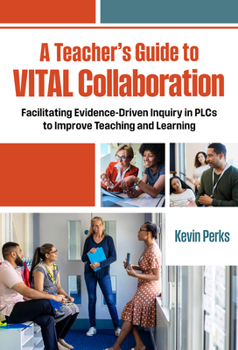A Teacher's Guide to Vital Collaboration: Facilitating Evidence-Driven Inquiry in Plcs to Improve Teaching and Learning
This guide provides K-12 educators with a structured, evidence-driven approach to Professional Learning Communities (PLCs), offering powerful tools and facilitation techniques to enhance both teaching and professional growth. Unlike typical approaches to data teams, the VITAL (Visibly Improving Teaching and Learning) Collaboration model uses concrete evidence from teacher practice and student learning to establish clear goals and pathways for equitable instructional improvement. It facilitates visible growth in both teachers and students by examining artifacts such as lessons, classroom observations, student work, and assessment data. The comprehensive framework integrates insights from research on teacher efficacy, improvement science, professional learning communities, and lesson study to optimize collaborative efforts. Teachers and school leaders will find practical strategies, protocols, and facilitation guidance to foster a culture of continuous improvement within their PLCs. Whether you are enhancing your instructional practices or guiding colleagues toward better outcomes, this guide will help you maximize the impact of every PLC session. This book is an excellent companion to Kevin Perks's A School Leader's Guide to VITAL Collaboration.
Book Features:
Evidence-Driven Approach: Departing from traditional models, VITAL fosters a cyclical, data-informed process where concrete evidence from teaching and student learning drives goal-setting and instructional improvement, leading to measurable gains in both teaching quality and student achievement. Comprehensive Framework: Integrates diverse educational methodologies, including school improvement science and lesson study into a cohesive framework, providing educators with a robust toolkit of protocols to optimize PLCs and drive meaningful change. Facilitation Guidance: Offers practical strategies, protocols, and facilitation guidance that empower teachers and leaders to effectively lead and participate in PLCs, fostering a culture of continuous improvement and professional growth. Focus on Equity: Prioritizes equitable student outcomes by ensuring that discussions and actions within PLCs are anchored in data-driven insights and strategies that support every learner's success. Practical Tools: Provides educators with actionable tools such as protocols for reviewing data, analyzing standards, goal setting, lesson tuning, and evaluating student work, enabling them to implement VITAL Collaboration principles immediately in their classrooms and schools.




